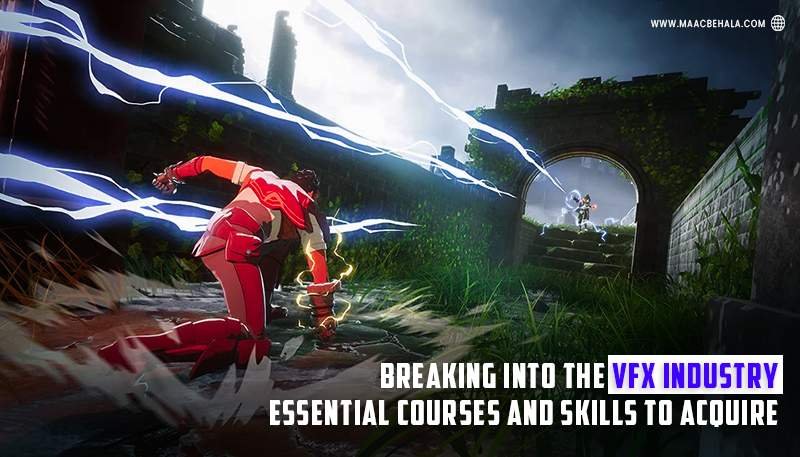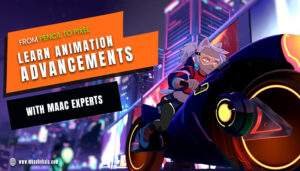Introduction:
This blog is for beginners and those who want to break the chain of animation and VFX can join this top VFX institute in Kolkata. Our institute will help in providing detailed courses about VFX and guiding you to build the safest career in the future. This blog explains all about the details of the VFX courses, careers, and opportunities.
The visual effects (VFX) industry is a dynamic and ever-evolving field, offering exciting career opportunities for creative and technically skilled individuals. If you’re looking to break into the VFX industry, acquiring the right courses and skills is crucial. In this blog, we’ll explore the essential courses offered by MAAC (Maya Academy of Advanced Cinematics) and the key skills you need to succeed in this competitive field.
Essential Courses and Skills to Acquire in MAAC Behala VFX Courses
1. VFX Plus Course: Building a Strong Foundation
- Overview: The VFX Plus course at MAAC is designed to provide a solid foundation in visual effects. This course covers all aspects of the VFX pipeline, from pre-production to post-production.
- Skills Acquired:
- Pre-Production: Learn storyboarding, concept art, and the basics of film language.
- 3D Animation: Gain expertise in modeling, texturing, rigging, and animation using industry-standard software like Autodesk Maya and 3ds Max.
- Visual Effects: Master compositing, rotoscoping, and color correction with software such as Adobe After Effects and Nuke.
- Post-Production: Learn the final touches required to produce polished, professional-quality VFX.
2. Advanced Program in Visual Effects (ADVFX): Delving Deeper
- Overview: The ADVFX program focuses on high-end VFX for films and television, diving deeper into complex aspects of VFX.
- Skills Acquired:
- Advanced Compositing: In-depth training on multi-pass compositing and 3D compositing techniques.
- Particle Effects: Create realistic particle effects like smoke, fire, and rain using software like Houdini or RealFlow.
- Dynamics and Simulation: Master advanced dynamics for simulating realistic movements and interactions in 3D environments.
- Matchmoving and Camera Tracking: Seamlessly integrate CGI elements with live-action footage.
3. Compositing & Editing Plus: Mastering Post-Production
- Overview: This course specializes in the compositing and editing aspects of VFX, which are crucial for post-production.
- Skills Acquired:
- Non-Linear Editing: Master software like Adobe Premiere Pro and Final Cut Pro for professional editing.
- Compositing Techniques: Detailed training in layer-based and node-based compositing using After Effects and Nuke.
- Color Grading: Enhance and correct colors to achieve the desired look and feel.
- Motion Graphics: Create engaging motion graphics for various media applications.
4. Specialization Courses: Focusing on Specific Areas
- Overview: These courses allow you to specialize in specific areas of VFX, catering to your interests and career goals.
- Skills Acquired:
- Stereoscopic Conversion: Techniques for converting 2D content into 3D stereoscopic content.
- VR and AR: Introduction to creating content for virtual reality and augmented reality platforms.
- Lighting and Rendering: Advanced techniques for realistic lighting and rendering using software like Arnold and V-Ray.
Key Skills to Master in VFX
- Artistic Skills:
- Drawing and Sketching: Fundamental for storyboarding and concept art.
- Color Theory: Understanding color schemes and their impact on the visual experience.
- Technical Skills:
- Software Proficiency: Mastery of industry-standard software like Maya, 3ds Max, After Effects, Nuke, Houdini, and others.
- Programming and Scripting: Basic understanding of programming languages like Python can be beneficial for automation and custom tool development.
- Analytical Skills:
- Problem-Solving: Ability to troubleshoot and solve complex issues during the VFX process.
- Attention to Detail: Ensuring that every element is perfectly aligned and realistic.
- Project Management:
- Time Management: Managing time to meet project deadlines using effective methods.
- Collaboration: Working effectively within a team, understanding different roles and responsibilities in a VFX pipeline.
Career Opportunities and Growth in VFX:
Investigating employment options is essential to learning how to work as a VFX designer. A variety of jobs are available in the VFX sector, such as supervisors of VFX, animators, 3D modelers, and compositors. Every role offers a varied path for advancement and calls for particular talents.
Opportunities for growth and ongoing learning are abundant in this dynamic and ever-evolving sector. You can advance to more professional roles like lead artist or VFX supervisor as you gain expertise. These positions entail more accountability, such as managing teams and projects.
Maintaining your flexibility and improving your abilities over time can open up intriguing chances in a variety of industries, such as virtual reality, gaming, cinema, and television. The field of visual effects (VFX) is in high demand and is a lucrative career path.
How to become a VFX artist after the 12th?
For those who want to become a VFX artist after completing 12th grade, the process that you need to follow is as:
- Pursue a bachelor’s degree in a related field, such as animation, computer graphics, or visual arts.
- Get practical experience from a reputed organisation like MAAC Behala best VFX training coaching in Kolkata.
- Networking is crucial. To network with professionals and gain insight from their experiences, go to industry workshops, seminars, and conferences.
- Lastly, continuously improve your skills using tools, techniques, and software.
Conclusion:
Breaking into the VFX industry requires a blend of creativity, technical expertise, and a willingness to continuously learn and adapt. MAAC’s comprehensive courses, from foundational to advanced programs, equip aspiring VFX artists with the essential skills needed to succeed. Whether you aim to work on blockbuster films, television shows, or innovative virtual reality projects, the right education and skill set will open the doors to a rewarding career in the VFX industry. Start your journey today and turn your creative visions into stunning visual realities.MAAC VFX courses provide a robust framework for budding VFX artists to develop a comprehensive skill set. From foundational courses like VFX Plus to advanced programs like ADVFX, students gain a thorough understanding of the VFX pipeline, mastering both artistic and technical aspects. Specialization courses offer the opportunity to focus on niche areas, ensuring a well-rounded education that prepares students for diverse roles in the VFX industry. Join MAAC Behala best VFX coaching in Kolkata that provides creative learning, and continuous growth to the students. The basic reason for the best coaching is a solid foundation, building a strong portfolio, gaining practical experience, and mastering technical skills that provide a rewarding career and top VFX artist.





